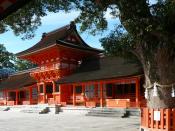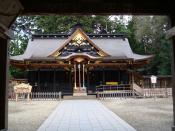Japanese Shinto: the Cult of Hachiman
Shinto is a generalized term describing the various indigenous beliefs in Japan, an attempt to distinguish those beliefs from the imported ideology of Buddhism. The success of such efforts, however, was only partial, leading to the evolution of the Honji-Suijaki principle of coexistence. One of the more popular Shinto deities was Hachiman, the kami of war, whose development and growth was a secondary feature resulting from its political manipulation by Buddhist priest and feudal warlords. The origin of Hachiman is corrupted by incoherencies in the textual support of Hachiman and often the unbelievable circumstances surrounding his birth. A brief overview of the origin of the birth of Hachiman and its development will reveal the incongruous and political nature of the cult.
The ambiguous origin of the Hachiman cult is a result of unreliable resources and often of fantastic literary compositions. Legends of Hachiman often associate his being in connection to that of Emperor Ojin. One interpretation reveals the divine nature of the birth of Ojin, who, upon the revelation of eight banners from Heaven at his birth, changes his name to Hachiman.1 Alternatively, Ojin is born from a magical dove, the symbol of Hachiman, and proclaims himself to be "the sixteenth human emperor, Homuda Tenno (Ojin), the broad-bannered Hachiman-maro."2 Textual evidence indicates that Ojin was the fifteenth reigning emperor and falsifies the suggestion that he was the sixteenth reigning emperor. The Shoku Nihongi3, the earliest document with reference to Hachiman (737 C.E.), recognized no Ojin-Hachiman connection. In fact, documents that directly connect Ojin with Hachiman date from no further than the Heian Period (794-1185 C.E.).4 Shinto priests testifying to the validity of the Ojin-Hachiman connection suggest that the existence of Hachiman prior to the reign of Ojin is negligible or unknown.5 Quite...


